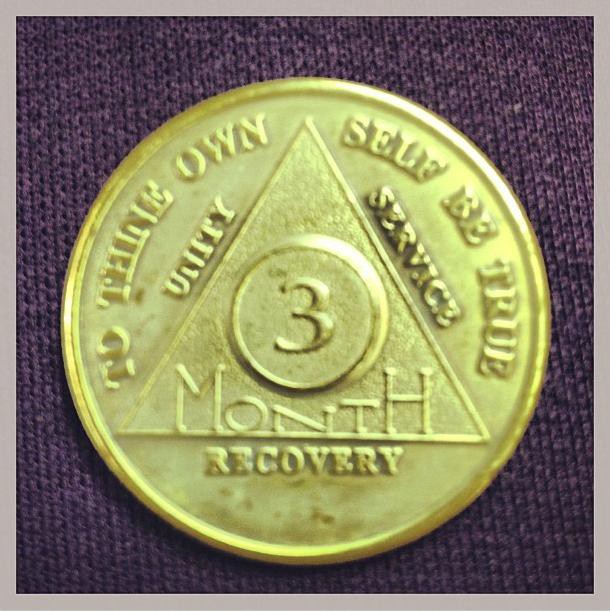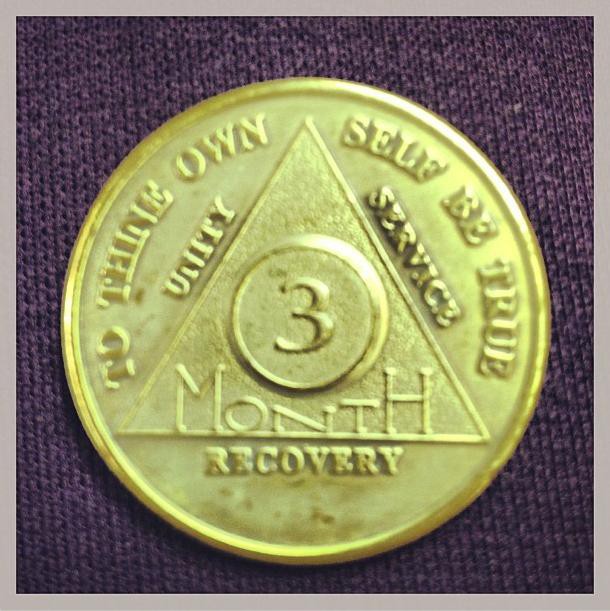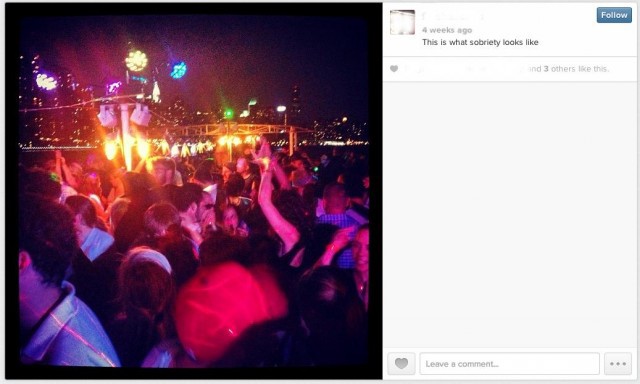“Status Update, I’m Sober”: Caitlin
by Melissa Batchelor Warnke


Caitlin, 25, grew up uneventfully in a wealthy New Jersey commuter town. After an ill-fated move west following a high school boyfriend, she attended Ithaca College. When she started working as a line cook, she started getting constantly high or drunk at the bar across the street. She knew she was an alcoholic, and had been for some time. She hadn’t made any real friends in college because she’d been holed up drinking in her room. She also knew she had to make a change before her daily cycle–work the afternoon shift, get wasted, pass out, sleep until noon–turned from a lost year into her life.
When she got into Columbia University’s School of Social Work, Caitlin felt like she’d proven that she wasn’t the dumb blonde her community had perceived her as. She thrived at Columbia–digging into class projects, making real friendships for the first time, and developing herself as an activist in anti-racist and feminist circles. But her progress was eventually derailed by an abusive relationship, and her alcoholism became increasingly isolating.
When I spoke with Caitlin, she had celebrated 9 months of sobriety and was working as a community mentor at a sober living facility. She was going to Yoga to the People and AA dances (“fun but also really awkward”) and taking a memoir-writing class. When my computer crashed and I lost the notes from our interview, she cheerfully did it all over again, as part of “her service.” This, I thought, is getting it together.
When did you get sober?
January 27, 2013. Before that I was a blackout drinker, going so far as to tell myself I simply had a “propensity” for blacking out. I drove and parallel parked in blackouts. I had unprotected sex with men I didn’t know. It’s a miracle I never got a STI or pregnant. I would get mean, angry, and crazy, throwing fits when I didn’t get my way. I would be immediately anxious and pissed off if I couldn’t drink when I wanted to or how much I wanted to.
What made you realize you couldn’t do it anymore?
In March of the previous year, I’d started an 8-month long abusive relationship with another alcoholic named Paul. Everything in that relationship was very fast: we moved in together two months after we met. Paul was the kind of alcoholic you imagine when you think about alcoholism–starting the day with a 40, drinking steadily throughout the day, focusing his energies on when he’s going to be able to get his next drink. He was unemployed, so he relied on me for everything, although he was an “alpha male” who couldn’t handle being dependent on someone else in theory. In practice, he had to, because he couldn’t hold down a job.
He still owes me around $11,000. When we were drinking together, it would get violent occasionally, but was mostly just psychologically and emotionally abusive. Toward the end, I would take a Percocet with a few glasses of wine and pass out as quickly as possible so I wouldn’t have to feel the pain of our relationship or talk to him.
You finally left him.
Yes, and after I did, it took me about two months to “find the rooms,” which is AA lingo for “get to a meeting.” During these two months, I found myself drinking when I really didn’t want to be–my hands always found themselves around a glass or a can. I found myself driving my little brother home from football practice with a buzz. I almost ran into my parents at a restaurant when I had to stop in to get a drink before I went home.
What kind of program did you enter?
My therapist had told me I should check out AA. I initially brushed her off because all my therapists had said that; I thought they didn’t understand how people my age drink. I still think this is true to a certain extent: many young people I know drink alcoholically but aren’t alcoholics. But I was tired of being miserable. After my last birthday party at the Slipper Room, where I enjoyed my beloved Old Fashioned, I stopped drinking and started going to meetings. And she put me on an antidepressant.
What was your first impression of AA?
The main problem I had with the program was always how God-centric and Christian-centric it was. My dad is 13 years sober through AA and he’s super Catholic. He told me that I would need to find God if I was going to “get the program.” But I found an amazing sponsor right away who was also an atheist.
So once you knew it was a fit, you started broadcasting your involvement.
I told all my friends and family as a way to hold myself accountable. I knew that if they knew that they would look out for me. I’m a social worker and a writer, so I like to be honest about my experience with the hope of helping someone else who thinks they might have a problem. I’ve also just been so happy that I’ve turned my life around and found that sobriety doesn’t have to be totally dull. It can actually be a lot of fun.
You use Instagram and Vine to share your experiences. What was the first image you posted?
My first photo on Instagram was a picture of this beautiful sculpture in a church garden with the caption “Serenity, Courage, Wisdom.” It may or may not have been obvious. But my second photo was of my 90-day sobriety coin. I hadn’t realized what a big deal it was until I got to that landmark and I was overwhelmed with pride for what I’d accomplished. I wanted to share that feeling with other people.

One of AA’s foundational tenets is anonymity. How do you feel social media fits into this frame, or rubs against it?
I’m still figuring out how I feel about it. Personally, I have no problem breaking my anonymity to people in person. I don’t post anything explicit on Facebook, saying that I’m in AA or that I’m working on the steps. I do sometimes post generally about the disease of addiction to raise awareness. One time, I posted a photo of my favorite band with the caption “So excited that I’ll actually remember them play this time!” I was happy to get a second chance at the experience.
I mostly get positive reactions. I just want to show people that sobriety is not “social suicide.” People who know that they need to get sober often worry that they would lose their friends and never have fun again. But they’re not real friends if they won’t make time to do sober things with you, or can’t understand why you wont go to the bar with them. And do you really want to do things that are only fun when you’re drunk or high? That’s how I figured out dubstep and fratty bars are actually terrible.
But my experience is very different from many people that I know, who have to stand up to a lot of opposition from family and friends for their decision to get sober.
Will you continue to use social media to talk about your progress?
I mention my sobriety on social media when I’m really excited about it and I’m having fun. I’m not sure if my opinions on that will change. I’m still in early recovery so I feel like I’m changing all the time. And there is still a lot of social stigma against addicts and alcoholics. Some people will want to protect themselves from people who might judge them.
And I still get a lot of “I know you don’t drink, but you’ve got to try this,” and “So you’re never going to drink, like ever, ever again?” It’s not anyone else’s responsibility to understand recovery–it’s my disease not theirs–but I want people to be at least be sensitive to the issue.
Most people don’t think of a girl like me when they think of alcoholics. They think of homeless men on the streets or maybe their aunt who always ruins holiday parties. Alcoholics can be anyone. They can be your 13-year old cousin who sneaks sips out of people’s drinks, they can be your 80-year old grandmother who starts her days with screwdrivers, they can be your football player brother who wins the case race at college. Addiction does not discriminate. That’s something I wish more people knew.
Previously: Paul Johnson Calderon
Melissa Batchelor Warnke tweets @thewarnke. If you are interested in being featured in the series or would like to be put in touch with Caitlin, please contact mwarnke09 [at] gmail [dot] com. We’re happy to run the stories anonymously.